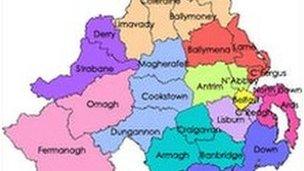Councillors' leaving pay 'depends on Troubles service'
- Published

Northern Ireland's 26 councils are being replaced with 11 super councils
Councillors in Northern Ireland who served during the Troubles are to be given extra severance money if they choose not to stand for the 11 new super councils.
The severance package for those who will not be going for re-election to the new councils has yet to be agreed.
But the environment minister, Alex Atwood, said those who served during the worst of the disorder and violence should get special recognition.
However, not all councillors agree.
Mr Attwood said the extra money was for councillors who worked hard for long years, "often through the worst of the disorder and violence in Northern Ireland".
Councillors earn a basic payment of about £10,000 a year.
It has been proposed that severance payments should be paid to those who decide not to stand to reward them for their service. But some councillors disagree with the way the scheme has been designed.
More than half of the current 582 councillors could apply for this money providing they meet certain criteria.
They have to have served a total of at least 12 years on a council and they have to give an undertaking that they will not stand for election in next year's local government elections.
It is only possible to get the money if they leave the council after this current term.
The maximum amount a councillor can receive is capped at £35,000 and, just like any other severance scheme, the first £30,000 would be tax free.
The way in which the amount is calculated has annoyed some councillors.
There are different options - but they all work on the basis that the longer you served before 1998 - that is the date of the Good Friday Agreement - the more you are entitled to.
For each year served before the Good Friday Agreement, a councillor could receive £1,000 a year.
And for each year they served after the agreement, the amount is £600. This is the option most Belfast city councillors favour.
But the weighting in favour of those who served on councils during the Troubles is something that not all councillors are happy with.
Davy Browne, an Ulster Unionist councillor in Belfast, said: "I do not see the logic of this," he said.
"There is a lot of talk about parity of esteem. We are all councillors, we all serve. It does not matter whether it is 10 years or 40 years. It should be a certain amount per year."
However, Mervyn Jones, who is also a councillor in Belfast, said: "I am in favour of the scheme. I would point out that to earn about £35,000 you need to have served for 40 years," he said.
"The system has been geared to those who served in earlier years. In 1985, you were not paid a salary, it was an attendance allowance. It has been weighted for long service and that is correct. The intention is to reward people who got very little for years.
"I would point out that I intend to stand again."
The councils will make the redundancy payments but will then be reimbursed by the Department of Environment.
The overall cost will depend on how many want to apply and that is difficult to estimate.
If, for example, half of those who are eligible go for it - about 130 - and they are, on average, entitled to half of the maximum rate (£17,500), then it would cost £2.3m.
However, at this stage, this is a very rough estimate.
- Published2 May 2013
- Published3 July 2012
- Published22 September 2011